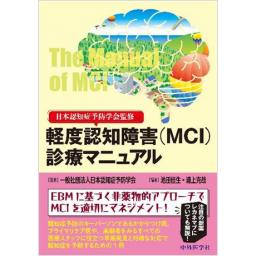1) 朝田隆. 4. 軽度認知機能障害(MCI)の概念. In:日本認知症学会. 認知症テキストブック. 東京:中外医学社;2014. p. 103-10.
2) 鷲見幸彦. 内科医に必要な軽度認知障害・認知症の診方. 日内会誌. 2020;109:1504-10.
3) Langa KM, Levine DA. The diagnosis and management of mild cognitive impairment:A clinical review. JAMA. 2014;312:2551-61.
4) van Dyck CH, Swanson CJ, Aisen P, et al. Lecanemab in early Alzheimer's disease. N Engl J Med. 2023;388:9-21.
5) Petersen RC. Mild cognitive impairment. Continuum (Minneap Minn). 2016;22:404-18.
6) Anderson ND. State of the science on mild cognitive impairment (MCI). CNS Spectr. 2019;24:78-87.
7) Kasper S, Bancher C, Eckert A, et al. Management of mild cognitive impairment (MCI):The need for national and international guidelines. World J Biol Psychiatry. 2020;21:579-94.
8) Reisberg B, Ferris S, de Leon MJ. Stage-specific behavioral, cognitive, and in vivo changes in community residing subjects with age-associated memory impairment and primary degenerative dementia of the Alzheimer type. Drug Dev Res. 1988;15:101-14.
9) Zaudig M, Mittelhammer J, Hiller W, et al. SIDAM-A structured interview for the diagnosis of dementia of the Alzheimer type, multi-infarct dementia and dementias of other etiology according to ICD-10 and DSM-III-R. Psychol Med. 1991;21:225-36.
10) Flicker C, Ferris SH, Reisberg B. Mild cognitive impairment in the elderly:predictors of dementia. Neurology. 1991;41:1006-9.
11) Morris JC. The clinical dementia rating (CDR):Current version and scoring rules. Neurology. 1993;43:2412-4.
12) Petersen RC, Smith GE, Waring SC, et al. Aging, memory, and mild cognitive impairment. Int Psychogeriatr. 1997;9:65-9.
13) Petersen RC, Smith GE, Waring SC, et al. Mild cognitive impairment:clinical characterization and outcome. Arch Neurol. 1999;56:303-8.
14) Winblad B, Palmer K, Kivipelto M, et al. Mild cognitive impairment--beyond controversies, towards a consensus:report of the International Working Group on Mild Cognitive Impairment. J Intern Med. 2004;256:240-6.
15) Albert MS, DeKosky ST, Dickson D, et al. The diagnosis of mild cognitive impairment due to Alzheimer's disease:recommendations from the National Institute on Aging-Alzheimer's Association workgroups on diagnostic guidelines for Alzheimer's disease. Alzheimers Dement. 2011;7:270-9.
16) American Psychiatric Association. Diagnostic and Statistical Manual of Mental Disorders, fifth edition. Washington, DC:American Psychiatric Publishing. 2013.
17) World Health Organization. 2018. International statistical classification of diseases and related health problems (11th Revision). https://www.who.int/classifications/icd/en/
18) 「認知症疾患診療ガイドライン」作成委員会. 認知症疾患診療ガイドライン2017. 東京:医学書院;2017.
19) Sperling RA, Aisen PS, Beckett LA, et al. Toward defining the preclinical stages of Alzheimer's disease:recommendations from the National Institute on Aging-Alzheimer's Association workgroups on diagnostic guidelines for Alzheimer's disease. Alzheimers Dement. 2011;7:280-92.
20) Dubois B, Feldman HH, Jacova C, et al. Advancing research diagnostic criteria for Alzheimer's disease:the IWG-2 criteria. Lancet Neurol. 2014;13:614-29.
21) Jack CR Jr, Bennett DA, Blennow K, et al. A/T/N:an unbiased descriptive classification scheme for Alzheimer disease biomarkers. Neurology. 2016;87:539-47.
22) Martin E, Velayudhan L. Neuropsychiatric symptoms in mild cognitive impairment:A Literature Review. Dement Geriatr Cogn Disord. 2020;49:146-55.
